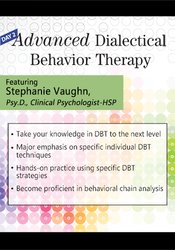

Take your current knowledge of DBT to the next level. This training will help you focus on individual DBT techniques, specifically the behavioral chain analysis. Many DBT clinicians agree that the individual mode of DBT is the most difficult mode to implement. This training will help you add another tool to your DBT tool belt and increase your confidence while delivering this comprehensive model.
National expert and speaker Dr. Stephanie Vaughn will use case examples, recordings of actual sessions, role-plays and an up-beat, high energy and down-to-earth presentation to teach these advanced topics. Stephanie has the unique ability to translate the most challenging concepts from DBT to simple practical terms, so you are ready to use these skills the next day with your clients.
| File type | File name | Number of pages | |
|---|---|---|---|
| Manual (3.18 MB) | 34 Pages | Available after Purchase | |
| Manual - French (3.18 MB) | 34 Pages | Available after Purchase | |
| Manual - Italian (3.18 MB) | 34 Pages | Available after Purchase |

Stephanie Vaughn, Psy.D., Clinical Psychologist-HSP is the founder of Psyche, PLLC, a boutique outpatient therapy practice located in the Nashville, TN and Boston, MA. She is an associate faculty member at Vanderbilt University in both the psychology and psychiatry departments. Dr. Vaughn conducts Dialectical Behavior Therapy (DBT) with both adolescents and adults as a Board Certified DBT Clinician™. She is an expert on therapy-interfering behaviors and contingency management for oppositional behaviors in adolescents.
Dr. Vaughn has worked in the intensive PTSD program at the Department of Veteran Affairs with soldiers returning from Afghanistan and Iraq and female soldiers suffering from Military Sexual Trauma where she implemented formal Prolonged Exposure (PE). She is active in the teaching and supervision of DBT for Vanderbilt’s psychology & counseling students and doctoral interns, as well as psychiatry residents. Dr. Vaughn has presented DBT workshops around the country for the last seven years and is a highly rated speaker. She founded and currently runs Vanderbilt’s DBT Peer Consultation Group. She has served as an expert consultant for a variety of hospitals, schools, and clinics around the country.
Speaker Disclosures:
Financial: Stephanie Vaughn maintains a private practice. She receives a speaking honorarium from PESI, Inc. She has no relevant financial relationships with ineligible organizations.
Non-financial: Stephanie Vaughn is a member of the American Psychological Association.
Movement, Speed, Flow and Dialectics
Communication/Stylistic Strategies
Stages and Targets of DBT — Structuring the Treatment
The Diary Card
The Behavioral Chain Analysis — The ingenuity of DBT
Core DBT Strategies: Validation
Please wait ...